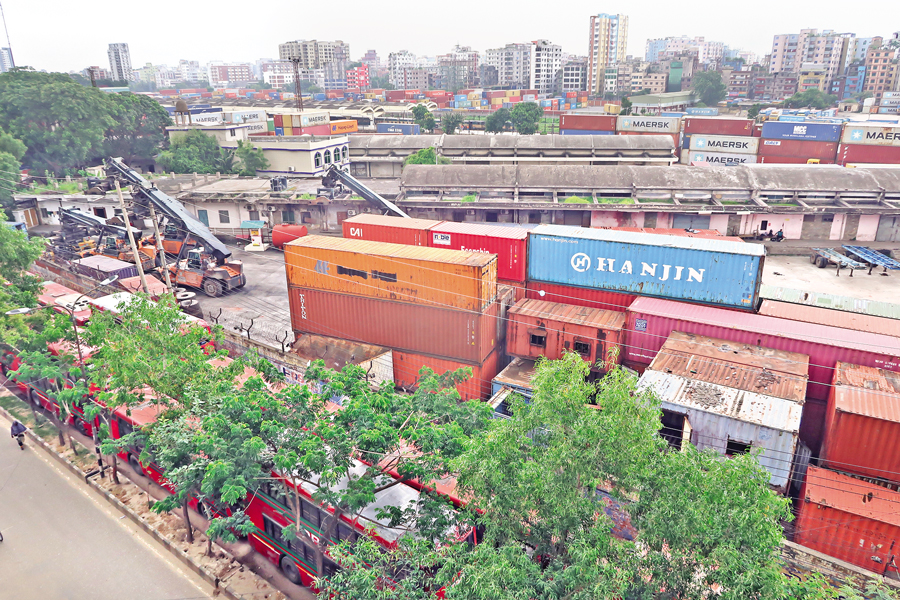Online Report
Trade-disrupting shutdown at the revenue board ends as the NBR Reform Unity Council called off its protest programme on Sunday evening following government’s preventive stance and business leaders’ mediation.
Council president Hasan Mohammad Tarek Rikabder announced the withdrawal of the shutdown programme at a press conference.
“Responding to requests from top business leaders and considering the need to maintain a smooth supply chain for export and import in the interest of the economy and the public, we have decided to withdraw the complete shutdown programme,” he said.
However, the platform will continue its activities in pursuit of a sustainable revenue system, he said at the press conference held at Bangladesh Chamber of Industry (BCI) office after a meeting with the business leaders who had earlier met with the finance adviser.
Meanwhile, all categories of jobs under the National Board of Revenue have been declared essential services with no scope for dereliction as an all-out staff strike blocked Bangladesh’s external trade and revenue mobilisation.
The government, by an order Sunday, warned the protesters against bifurcation of the NBR to resume work forthwith or face “stringent action”.
The order on essential services applies to all across customs houses, ICDs, bond commissionerates and customs stations.
The decision is taken “in the national interest of keeping essential import-export and foreign-trade operations running”, says a statement issued by the government amid the ongoing shutdown programme enforced by NBR staff members across the country, for a second straight day, at the height of their prolonged protests.
The government hopes that the officers and employees will “immediately return to work and withdraw from all illegal and anti-nation activities”.
“Otherwise, the government will be compelled to take strict measures to protect the public and the national economy,” says the furman from the post-uprising interim government, explaining what warranted a recast of the state revenue system.
“The most significant limitation in implementing development-oriented activities within Bangladesh’s budget management lies in its weak revenue-collection system. Compared to the state’s needs, our revenue collection is considerably low. This is primarily due to various weaknesses, irregularities, and corruption in our revenue management system.”
In this context, the interim government has decided to restructure the National Board of Revenue (NBR) in consultation with all relevant stakeholders, the statement notes.
“The government has observed with deep concern that, for the past two months, certain officials and employees-under the pretext of protest-have been unjustly and unethically disrupting the country’s business and trade activities, import-export operations, and revenue-collection processes,” the government says in the strongly worded statement, adding that this “unprecedented disruption has caused extreme suffering and is completely unacceptable.”
It goes on: “Beyond simply opposing the reforms, they have severely hindered revenue collection during the final two months of the fiscal year. This so-called movement is both premeditated and malicious, standing in stark opposition to national interests and citizens’ rights.”
The statement mentions that despite the government’s clear declaration that it is open to considering the demands of NBR officers and employees-and its repeated calls for dialogue-“they have chosen to disregard these efforts. Instead of seeking an acceptable solution through discussions, they have taken an uncompromising stance, continuing to damage the nation’s economy in the name of protest”.
As the country’s trade and tax collection collapsed for the shutdown, business leaders began mediating to resolve the unrest in the revenue administration to find an amicable solution.
On Sunday, leaders of major business chambers held meetings with the protesting officers of the National Board of Revenue and Finance adviser Dr Salehuddin Ahmed in this regard. In the morning, they held meeting with NBR officials and met the finance adviser in the evening.
Mahbubur Rahman, President of the International Chamber of Commerce (ICC) Bangladesh, A.K. Azad, Vice President of the ICC,B and former President of the FBCCI, Tapan Chowdhury, former Adviser of the Caretaker Government and Managing Director of Square Pharmaceuticals, Mir Nasir Hossain, former FBCCI President, Syed Nasim Manzur, President of the Leather Goods and Footwear Manufacturers & Exporters Association of Bangladesh (LFMEAB), Mahmud Hasan Khan, President of BGMEA, Anwar-ul-Alam Chowdhury, President of Bangladesh Chamber of Industries (BCI), Kamran T. Rahman, President of the Metropolitan Chamber of Commerce and Industry (MCCI), and Simin Rahman, Vice President of MCCI and Group CEO of Transcom Group, Shamim Ehsan, executive president of Bangladesh Knitwear Manufacturers and Exporters Association (BKMEA), and Taskeen Ahmed, president Dhaka Chamber of Commerce and Industry (DCCI), attended the meeting with the finance adviser.
NBR Chairman Md. Abdur Rahman Khan was also in attendance.
After the meeting was over, the top business leaders again rushed to sit with the NBR officials at night in the Bangladesh Chamber of Industries (BCI) office at Tejgaon.
Government’s Cabinet Division formed a five member committee comprising key advisers to resolve any hindrances to trade and export-import operations.
Energy adviser Dr Foujul Kabir Khan, the head of the committee, said the high-powered body has been formed to resolve any trade-and business-related hindrances on export-import or other aspects.
“The team will sit with the stakeholders and resolve the complexities in doing business,” he added.
“The committee is not mandated for only resolving the ongoing problems in NBR but, obviously, the issue would be taken care of.”
Sources said the MoF-business meeting aimed at safeguarding the protesting officials as well as expediting the process of NBR reform.


